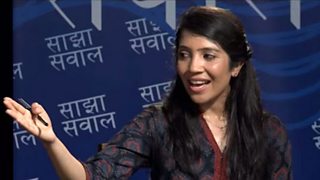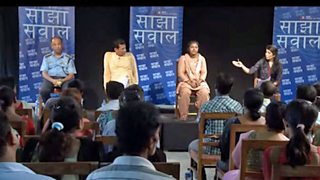Stories about violence against women in Nepal are, sadly, not rare. Since my schooldays, I’ve heard of women beaten by in-laws or taking their own lives because they could no longer stand the abuse.
But I also vividly recall other stories I heard as a girl. That of a young woman for example, who was asked for a motorbike as a dowry by her prospective husband and his family. Her response? She told him he should marry the motorbike instead and put the bridal garland of flowers on the bike and not her.
This story has always inspired me to stand up for my rights and help other vulnerable people in society. So I’m thrilled to say that as the new presenter for ������̳ Media Action’s debate show in Nepal, Sajha Sawal (Common Questions), I’m doing exactly that.

Pressing issues
With over 350 episodes now broadcast, the weekly TV and radio show tours the country to enable people to directly question their leaders, setting the agenda on the issues that matter to them the most.
The topic of violence against women, therefore, has been raised on Sajha Sawal many times before.
But this time we took a different approach and decided to focus on dowry-related violence. The decision was sparked not only by a report on the issue by the National Women’s Commission of Nepal but also an awful recent case that made national headlines: an 18-year-old girl was severely burned by her husband and mother-in-law because her parents couldn’t produce the demanded dowry.
The dowry system also seems to be a sad fact of life in Nepal. The amount of dowry one receives or pays is all too often seen as a sign of family prestige. A common question used among families is, “How much did you pay for your daughter?” Some government ministers, meanwhile, describe their unaccounted assets as their dowry.
Moving testimonies
Ahead of the recording of the show, I interviewed a woman from the eastern Tarai region of Nepal called Anila Karna. She had and her husband lost their daughter in a dowry-related murder.
She broke into tears as soon as she saw me because, she told me, I reminded her of her daughter.
My eyes too were filled with tears. I couldn’t help but hug her and she cried on my shoulder. After 15 minutes, she composed herself and gave us a powerful interview.
“My son-in-law came to my house one day and demanded that we provide him with a LCD TV and a refrigerator as a dowry,” she said. “He also threatened me that if I failed to provide the dowry on the same day, the result would not be good. Later that night, they called me to say, ‘Your daughter has committed suicide’. If I had known that they wouldn’t kill my daughter if I provided the dowry, I would have begged and fulfilled their demands.”
“The court has already given a [guilty] verdict against them,” she said. “But these culprits who should be in jail have run away. For the last five years we have tried everything but still haven’t got any justice.”
Accountability in action
Many people also took the opportunity of the show to complain that the police do not take such crimes seriously.
For example, we heard from a 23-year-old woman, whose identity we disguised through blurring her face on screen. She had been beaten by her in-laws but said when she went to the police station, she didn’t get enough support. Another woman told a similar story: local police ignored her case, she said, so that the only way to get away from the violence she was experiencing was to leave her husband’s house and return to her parents.
One of the panellists whom we had invited to respond was Senior Superintendent of Police, Shiva Lamichhane.
He promised, “The police will take action against the culprits of such crimes,” and in one of the cases featured in the programme, he promised his force would take action in 24 hours and resolve the case. We’ll be keeping an eye on his commitment.

Our panel also included former government minister Ram Chandra Jha, who said he would look into addressing these issues on the political front.
I may be the first female presenter of Sajha Sawal but, of course, I won’t be focussing purely on women’s issues. I’m looking forward to tackling the many issues that our audiences want discussed: corruption, the quality of public services, migration and the constitution to name but a few.
I can’t wait.
Related links
Follow ������̳ Media Action on and
